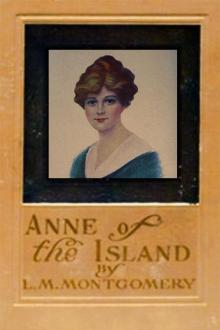- Home
- L. M. Montgomery
A Name for Herself Page 20
A Name for Herself Read online
Page 20
Some day I’m going to write a treatise on the virtues of laziness. I like lazy people. They rest me.
Hands will go up in horror over this and there will be sotto voce remarks about birds of a feather.229 But that cap doesn’t fit so I won’t wear it.230
There is wisdom in laziness – up to a certain degree. What is the use, as we used to say at school, of killing yourself to keep yourself alive? A delightful condition of leisurely contentment conduces to longevity. It’s all nonsense to insist that one must always be doing something. They used to tell us when we were small that Satan always found some mischief still for idle hands to do and frightened us into being industrious that way.231 But there are always two sides to every question.
It’s wise to rest well and thoroughly sometimes – to give over being fussily energetic and dream dreams. It’s never wise to fritter away one’s strength by “doing something” every minute. Time may be saved, but vitality will be wasted.
I remember when I was a child people used to tell me that the early bird captured the worm.232 I used sometimes to want to ask them – what about the worm? I never did; but to this day I firmly believe that if the worm were not out so early he might not be caught – and gobbled down without grace.
“Strenuous” is the fashionable word just now. We hurry and scurry and forget altogether what rest really means. We forget that while it is a good thing to do it is sometimes just as desirable simply to be. “The world is too much with us.”233
When I propounded these statements around the table the other night Polly sighed and said she was glad she was justified at last and that the next time I tried to hustle her out of bed early in the morning she would know what to say to me.
Theodosia is going to give a photographic party next week. She expects to get a lot of fun out of it.234
Each guest is expected to bring a photograph of him or herself in infancy – the earliest that can be procured – and the entertainment is to be derived from the efforts of the company to identify the likenesses. All the photos will be pinned on a large square board and numbered. Each guest will be given a list to fill up and the one who has the largest number of correct guesses will win a prize. There will be a fine for making a mistake in regard to the sex.
“Isn’t it lovely!” sighed Polly rapturously. We were at one of the Symphony concerts and she referred to a chorus. I agreed with her: it was lovely.
The other night at the Academy of Music Polly gazed with fascinated eyes at the clever antics of “Foxie.” “Isn’t he lovely?” she whispered to me radiantly.
Last Sunday we took a walk in the Park. The blue waters of the harbor sparkled and shimmered in the sunshine. The wind purred softly among the crests of the pines and sent resinous whiffs down the long dreamy avenues. “Isn’t it lovely?” said Polly, with a deep-drawn breath of delight.
When we went home I picked up a number of Ainslie’s Magazine235 and opened it at the full page picture of a rhinoceros’ head – the most uniquely ugly thing I ever put my eyes on. Polly looked over my shoulder. “Oh, isn’t he lovely?” she demanded admiringly.
[How Kissing Was Discovered]
Monday, 31 March 1902
EASTER IS OVER. THEO AND I USED TO ROAM AROUND town last week enjoying the display of Easter flowers in the shop windows. What lovely things flowers are, anyway! They are one of the few blessings that escaped unharmed from Eden.
Speaking of Easter flowers reminds me of a pretty legend I heard the other day concerning the origin of the Easter lily. A lily, blood-red in hue, grew at the entrance to the tomb where the Christ was buried.236 So great was its sorrow for him that its red petals blanched with its grieving through the long hours in which He lay entombed and on the morning of the resurrection it was as white as snow.
When the angels rolled the stone away and the Christ came forth his first wonderful smile fell upon the drooping white lily at His feet and instantly it was invested with a grace and beauty no lily had ever possessed before. That was the first Easter lily and ever since it has been the symbol of the resurrection.
In reading – or, rather, re-reading, for it is one of my book-loves – Oliver Wendell Holmes’ “Professor” the other day, I came across a piquant phrase in which he speaks of a person who “had an east-wind in his soul.”237 I at once shut the book and ruminated awhile. I knew I had found out what was the matter with some folks of my acquaintance. I had often wondered what their complaint might be called – and here it was diagnosed for me – “east wind in the soul.”
We all know them – those people with east wind in their souls. There is a chill in their presence – you can feel it when they are coming towards you a block away. Somehow, they seem to throw a blight over everything. Uncomfortable themselves, they want to make everybody else uncomfortable too. They are growly and discontented. If they see you enjoying yourself innocently they can’t rest until they have poisoned your enjoyment by a sneer or a gloomy prediction. They look chronically on the dark side of things and try to make everybody else do likewise.
Oh, they are very uncomfortable kind of folks to have around. It’s bad enough to have the east-wind get in your bones and it’s worse still to have it get on your nerves. But it’s worst of all to have it get in your soul. If you feel any premonitory symptoms hasten to get rid of it before it gets chronic. If you don’t there is no hope for you – in this world at any rate.
Last week an article appeared in the Echo on the “History of Kissing.” It fell short, however, in that it told us nothing of the origin of kissing. Here is the story. I don’t vouch for it, remember – I wasn’t around at the time. “I tell the tale as ’twas told to me.”238
Kissing was invented in Greece, where so many good things have been discovered. Kisthenes was a young shepherd who daily tended his flocks on old Mount Pelion and his sweetheart Aglaia, who lived in the little village at its foot, used to go up the mountain every day to chat with him.
One day she came to a brook and saw something sparkling among its pebbles. She picked it up and it was a very beautiful stone, shimmering with all the colors of the rainbow.
“What a nice present this will be for my Kisthenes,” said Aglaia.
Just then she heard a noise and looking around saw the god Pan peering at her from a thicket of laurels. Pan was very angry. This brook was under his special protection and all gems found in it were his. So he demanded the stone from Aglaia.
Aglaia promptly ran and Pan ran after her up the slope of the mountain. Aglaia was a very fleet-footed maiden, so she managed to keep ahead of him and came upon Kisthenes just as Pan had very nearly captured her. She flung herself breathlessly into her lover’s stout arms and Kisthenes implored Pan to go away like a good soul and leave them in peace.
Pan was the god of shepherds, so, though he didn’t want to at all, he had to grant the prayer of Kisthenes. He clattered off in a shocking temper and Kisthenes tried to soothe Aglaia, whose nerves were badly upset by her scamper up the mountain.
“Where is the pebble?” asked Kisthenes when she had faltered out her story. “I suppose you dropped it in your flight.”
Not so. Aglaia had, with commendable presence of mind, clapped the gem into her rosy mouth. There it still was safe and sound; and now the question was, how could she give it to Kisthenes?
Her arms were pinioned to her sides by Kisthenes’ clasp and if he let her go or loosened one of his arms to take the pebble Aglaia would fall to the ground, so weak and trembling was she. Aglaia solved the puzzle. She poked the gem out between her pretty lips and told Kisthenes to take it with his.
Kisthenes stooped to do so and in a trice he forgot all about the gem – in fact, it was never heard of again – for as his lips touched Aglaia’s such thrills and trills and semi-demi-quavers chased each other all over him that he could think of nothing else. Kissing was discovered.
Kisthenes and Aglaia, after several experiments, decided that they would keep it all to themselves – which was very selfish
of them, but lovers are proverbially like that. However, Aglaia had a very dear school friend down in the village and, under solemn promise of secrecy, she told her friend about this new thing which, in honor of Kisthenes, she named “kissing.” Her friend had a young man of her own and she told him about it. He – being a sad flirt – had two other girls over in another village on Mount Ossa, and he told them about it. And so it spread. All authorities agree that this is the most reliable account of the origin of kissing.
[Charms and Superstitions, Tricks and Surprises]
Monday, 7 April 1902
DID YOU GET APRIL FOOLED LAST WEEK? AT OUR HOUSE we all arose on April’s birth morning with a grim determination not to believe a word that our best friends said to us or tamper with anything that looked suspicious the whole day through. And yet, the sorrowful fact remains that – I blush to admit it – I fell into the very first trap with grace and agility.
When I went downstairs Ted was in the hall looking over a morning paper with a very shocked face.
“Cynthia,” he said, with a shudder – oh, it was very well done. In justice to myself I must say that – “this is frightful. There has been a terrible accident up at the north end – nine lives lost.”
“Oh,” I gasped, feeling a dozen thrills of horror. “Oh, Ted, what happened?”
“A street car ran over a cat,” said Ted solemnly.
And there I was! If it had even been a new joke there would have been some excuse for me. But it is old – so old! Why, it has been going the rounds of the funny columns for years.
Well, I tried to take it meekly and all through breakfast I brooded over my revenge. When Ted started to go down town I called to him and asked him if he would mind doing an errand for me. He said no, of course not. So I wrote out a memorandum and told him to get me three yards of sparrowbill purple ribbon.
“Be very careful to get sparrowbill,” I said. “No other shade of purple will do. I want it to match my new suit. I daresay they won’t have it at all the stores. It’s a new shade.”
“I’ll hunt around until I get it,” said Ted so obligingly that I felt a slight pang of remorse – until I remembered that hideous joke.
When Ted came home at night he looked as if he were suffering from that tired feeling.
“I couldn’t get that fiendish shade of ribbon you wanted, Cynthia,” he said wearily. “I’ve been to every dry goods store in Halifax and the clerks all looked at me as if they thought I was crazy. Said they’d never heard of sparrowbill purple.”
“No more did I,” I said maliciously. “You shouldn’t go gunning for new shades on the first of April, Teddy-boy.”
Ted, not being dull of comprehension, understood. He grinned.
“Guess we are square,” he said frankly.
Gertrude and Phil came to visit us last week and brought along their baby. It is the most wonderful baby that was ever born. It is about the only baby of any account in the world. At least, this is the way Gertrude and Phil seem to regard it. To me it looked just like any other baby, but, of course, as Gertrude said scornfully, I’m no judge. To me all babies as new as this one look so much alike as so many peas.
To be sure, Gertrude’s baby must have a very good constitution or it would never have lived through all the petting and pulling about it has got at our house since it came. Polly and Theo fight regularly as to who shall hold it and even Ted sneaks in whenever he gets a chance to look at it lying asleep in its cradle.
One evening, when Gertrude was sitting with her baby in her lap and the rest of us were all disposed around her in a circle, like an admiring court around its queen, we began talking about the various superstitions about babies.
“I hope the baby was carried upstairs before it was carried down, Gertrude,” said Aunt Janet. “If it wasn’t it will never have any luck in life.”
“Do you keep a cat?” said Theodosia. “I’ve heard somewhere that a baby and a kitten cannot thrive in the same house. One of them will pine away.”
“When you have a baby christened,” said Ted, “if it does not cry a little it will have bad luck all its life. You’d better pinch the baby, Gertie, to make sure.”
“If you cut or trim its nails the first year of its life it will be light fingered,” said Polly, “and you must not let it look into a mirror until it is a year old; it will grow up proud and vain.”
“Never rock the cradle when the baby isn’t in it,” said Marion. “To do so will bring disease or misfortune on it.”
“You should never walk entirely around a baby,” said Gertrude. “That brings ill-luck, too.”
“If a baby is born at new moon time it will be blessed with a well-hung tongue,” said Aunt Debby, “and if born during the last quarter it will have a keen reason.”
Everybody had said something but myself, so, not to be behind hand, I quoted the old rhyme:
“Monday’s child is fair of face,
Tuesday’s child is blessed with grace,
Wednesday’s child is born for woe,
Thursday’s child has far to go,
Friday’s child is loving and giving,
Saturday’s child must work for his living,
But the child that is born on the Sabbath day
Is bonny and blithe and good and gay.”239
“Surprises,” said Theodosia crossly, “are dangerous – deadly – positively immoral. I never feel more wicked than I do just after I’ve been surprised.”
“Some surprises are nice,” said Polly dubiously.
“Very few,” I chimed in. “I agree with Theodosia.240 The right kind of surprises is rare and when they do come they come at the wrong time. I hate to be surprised.”
A surprise, even an agreeable surprise, is more or less of a shock. Few of us are at our best when taken by surprise. We are at a disadvantage and we feel that isn’t fair. Sometimes you’ll hear folks saying, “Oh, we never let Kitty know when we’re coming. She’s always glad to see us and it is so pleasant to give her a little surprise.”
It may be pleasant for them. I’m very sure it isn’t for Kitty no matter how well she may disguise it. Doubtless, she has a dozen plans that are all wrecked by the sudden appearance of even welcome guests. And, if the guests happen not to be welcome – well, that is adding insult to injury.
Oh, I wish all my friends and relatives would break themselves of the surprise habit. But I suppose that is too much to expect in this world.
Polly believes – or pretends to believe – in charms, so at Easter we all gave her one. Ted gave her an enamel four-leaved clover – for good luck, of course. I gave her an ancient coin which insures good fortune at games – Polly has won every game of ping-pong she has played since. Theodosia gave her a silver pine cone which preserves from sickness, and Gwennie gave her hazelnut, which is said to bring great length of days.
[Smiles and Tears]
Monday, 14 April 1902
APRIL HAS SO FAR WELL SUSTAINED HER REPUTATION AS a month of smiles and tears, hasn’t she? Only it really seems to me that so far we have had a great many more tears than smiles. Theodosia dislikes April’s teary side because she cannot keep her hair in curl. Polly hates it because she cannot wear her new hat and Ted and I growl at it on general principles. But Aunt Janet, bless her, smiles placidly and says:
“Never mind, dears. You know it’s bound to clear up sometime.”
There is a great deal of sound philosophy in that remark of Aunt Janet’s, not only as regards April weather but all the other cares and troubles of life under the present dispensation. What a comfort it is, when things are going badly and there are big black clouds in our skies and a Scotch mist over all our plans and hopes, to remember that it’s bound to clear up sometime – that sometime the sun will shine out over the clouds and the mists will loop themselves up into curtains of glory on the hills and then fade away altogether, and that our worries will straighten themselves out in the long run.
Somebody has said that April is like a woman beca
use of her smiles and tears.241 Polly looks upon that as a slander on our sex but I don’t. Sometimes tears are just as good as smiles and if a woman doesn’t indulge in both pretty often you may depend that there is something wrong in her make-up.
A good, comfortable cry is the most nerve-soothing thing in the world – if you pick a good time for it. You don’t want to be seen, of course, for some time after you’ve indulged in it. The other day I had one. It was pouring cats and dogs out of doors and my plans were all spoiled and I had fought with Polly, and Theo was away and I was horribly lonesome. I crawled away to a corner and buried my nose in a cushion and had a lovely howl. I thought of all the mistakes I’d made and raked up all my old, forgotten troubles and oh, I was deliciously miserable and it did me such heaps of good, that luxurious cry did. I felt all right and happy and cheerful when I had got through.
The other day Polly “straightened out” her top bureau drawer.
That top bureau drawer of Polly’s is one of our standing family jokes. When we want to express terrible confusion we never think of comparing it to original chaos. Oh, no! We say it is as bad as Polly’s top bureau drawer.
Polly “straightens” it out about once every month and when she finishes she says with a little purr of self-congratulation:
“There, now! That’s all nice and neat and I’m going to keep it so. What are you grinning at, Cynthia?”
I never grin. That is only Polly’s way of putting it, you know. But I do smile when I hear Polly make that remark.
I know that at the end of twenty-four hours that bureau drawer’s last state will be worse than its first – one awful tangle of ribbons and gloves and ties and hankys, seeming to have no beginning or ending, and when Polly wants to find anything she has to claw it all over wildly half a dozen times before she finds it.

 Mistress Pat
Mistress Pat A Tangled Web
A Tangled Web Anne of Green Gables
Anne of Green Gables Further Chronicles of Avonlea
Further Chronicles of Avonlea Magic for Marigold
Magic for Marigold Pat of Silver Bush
Pat of Silver Bush Anne of Avonlea
Anne of Avonlea Anne of the Island
Anne of the Island The Blue Castle
The Blue Castle The Blythes Are Quoted
The Blythes Are Quoted Emily of New Moon
Emily of New Moon Rainbow Valley
Rainbow Valley Rilla of Ingleside
Rilla of Ingleside 07 - Rainbow Valley
07 - Rainbow Valley Anne of Green Gables (Penguin)
Anne of Green Gables (Penguin) Emily Climbs
Emily Climbs Emily's Quest
Emily's Quest A Name for Herself
A Name for Herself Anne of Windy Poplars
Anne of Windy Poplars The Complete Works of L M Montgomery
The Complete Works of L M Montgomery The Story Girl
The Story Girl Anne's House of Dreams
Anne's House of Dreams Jane of Lantern Hill
Jane of Lantern Hill Anne of Ingleside
Anne of Ingleside